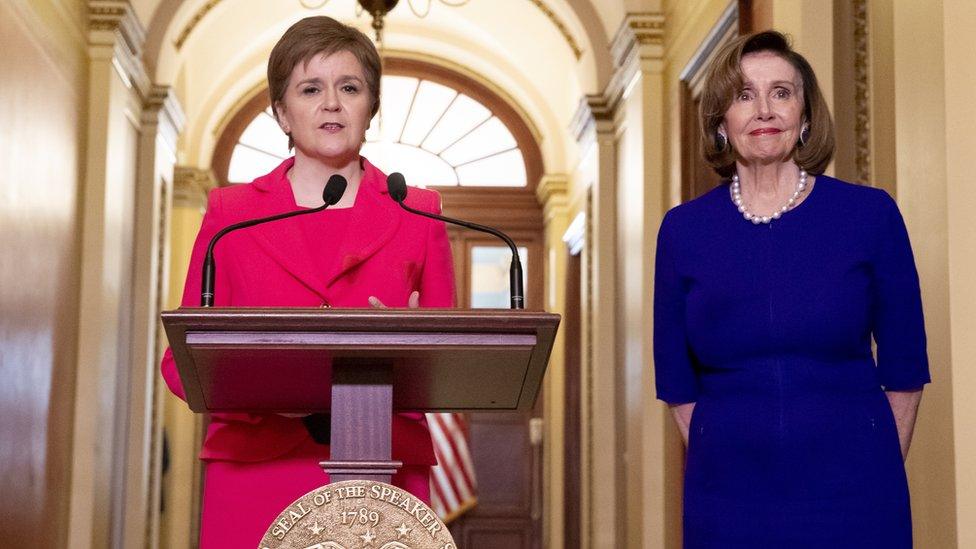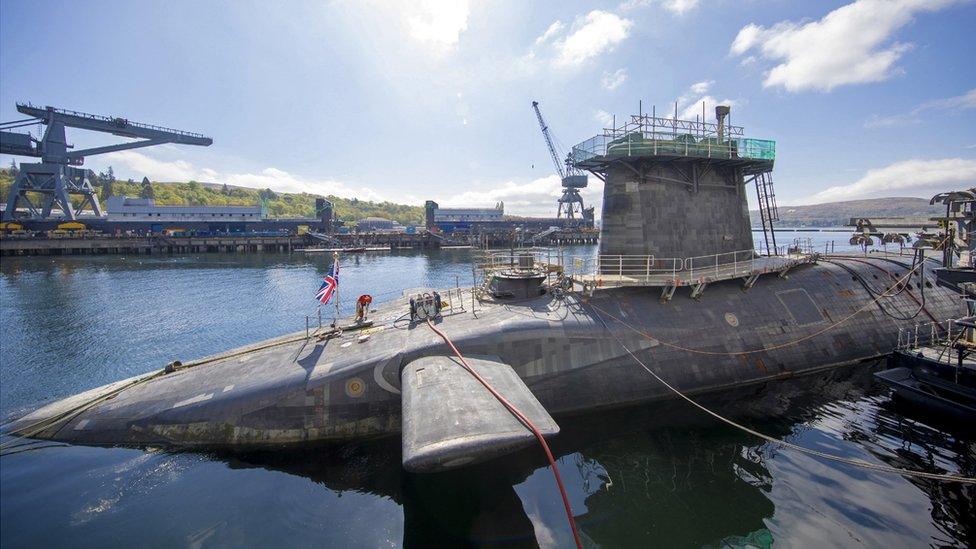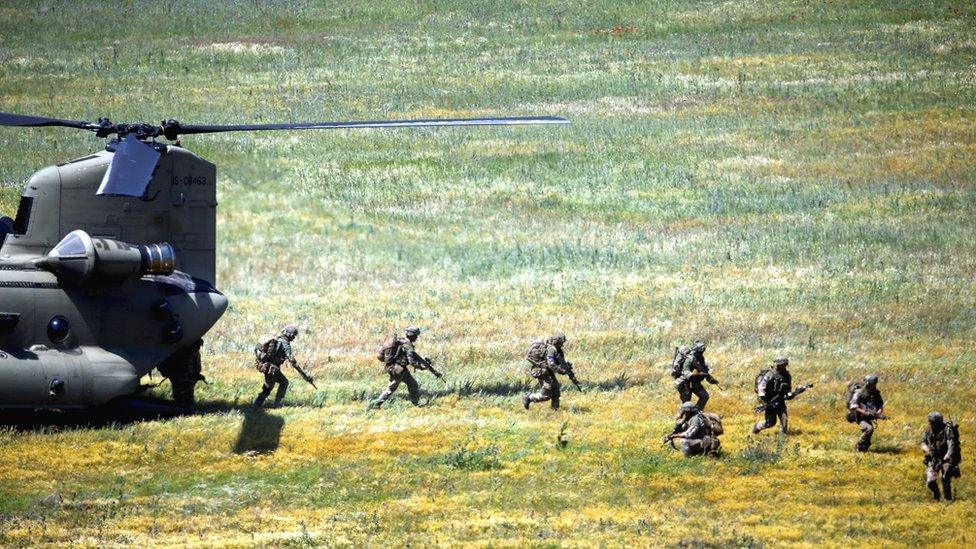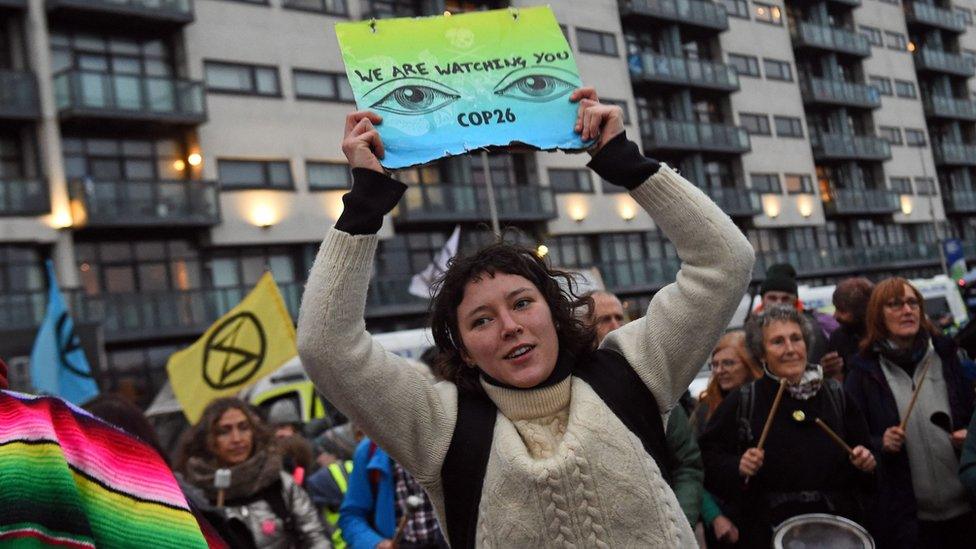How Ukraine war influenced the SNP's Nato position
- Published

Nicola Sturgeon met US Speaker of the House Nancy Pelosi in Washington DC
There was a time when the SNP was opposed to Nato membership.
In fact it is not yet 10 years since the party changed position in preparation for the independence referendum, prompting three MSPs to quit their Holyrood group.
One switched to the Scottish Greens, which remains an anti-Nato party and now shares power with the SNP at Holyrood.
In 2013, the SNP leader, Alex Salmond, travelled to Washington DC in an effort to reassure the Americans that an independent Scotland would be a reliable defence partner.
He told me back then he was "certain" a membership application would be accepted despite the SNP's determination to remove the UK's nuclear arsenal from Scotland.
Non-nuclear membership of the 28-member North Atlantic Treaty Organization remains the party's objective, although Nicola Sturgeon did not mention that detail on Monday when she addressed the Brookings Institution during a visit to the US.
She simply stated that membership of the defensive military alliance would be "vital" to an independent Scotland, a "cornerstone" of its security policy and that the war in Ukraine had strengthened her conviction on this.
The SNP points out that countries like Finland and Sweden - now seeking to join Nato - do not have nuclear weapons and have no intention of acquiring them.
These countries are not, however, proposing to remove nuclear weapons from their territory while signing up to a defence pact underpinned by nuclear capability.

HMS Vigilant is one of the UK's four nuclear warhead-carrying submarines
The UK's nuclear warheads and the four submarines capable of firing them are all based in Scotland. There is currently no suitable alternative home for them elsewhere in the UK.
That would obviously present a big problem for the UK in the event of Scottish independence and some unwelcome uncertainty for the Nato alliance.
That would not necessarily be a deal breaker for Scottish membership. Nato is unlikely to want to lose strategically important territory.
Phillips O'Brien, professor of strategic studies at St Andrews University, explained: "It all depends how Scotland would define anti-nuclear".
He told BBC Radio Scotland: "If it defined anti-nuclear as 'at no time will nuclear weapons ever be allowed on a naval ship in Scottish waters', then that indeed would probably make Scotland not eligible for Nato but I don't think they're defining it that rigidly".
It was defined fairly rigidly back in 2012 when Alex Salmond told the BBC that "an independent Scotland would not have possession of or allow nuclear weapons in Scottish territory".
'Significant shift in opinion'
Multiple SNP and Scottish government sources insist their policy has not changed but the SNP's defence spokesman Stewart McDonald sounds more accommodating.
"I'm not suggesting for a minute that we would turn our backs on what's expected of us as an alliance member but we very clearly wouldn't become a permanent base for nuclear weapons," he told me.
Note the use of the word permanently which appears not to rule out temporary arrangements.
Certainly, nothing in his comment indicates that a visiting nuclear-armed vessel from the US, France or UK would be turned away, even if the Scottish expectation would be against such visits.
In any event, Mr McDonald is clear that an independent Scotland would fulfil all the requirements of Nato membership.
His party has never sounded more enthusiastic about joining.
One source close to Nicola Sturgeon said there had been a "significant shift in opinion in the party and the wider independence movement" since the invasion of Ukraine towards a "much more firm and unconditional place in Nato".

British soldiers during a Nato exercise in North Macedonia
Recent polling suggested a majority of Scots want the UK to retain its nuclear weapons although those consulted by Survation for the pro-UK campaign Scotland in Union were not asked where they should be based.
Scottish ministers are seeking to reassure the international community about the security posture of an independent Scotland in preparation for a possible indyref2.
They would like to hold that vote before the end of 2023 but that timetable seems unlikely given that the UK government is determined to resist.
The SNP's support for Nato membership is not shared with their Green partners in power in the Scottish government.
The Greens co-leader Patrick Harvie - who is a minister in the government - told me his party "objects to Nato's first-strike nuclear policy" and will continue to advocate for a different approach.
Green MSP Ross Greer went further on The Nine, arguing that it would be "morally wrong" for Scotland to join the alliance.
Nato policy is specifically excluded from the Greens power-sharing agreement with the SNP because of the fundamental disagreement between the parties.
By contrast, the Scottish Conservative leader, Douglas Ross, wants Scotland to remain in Nato as part of the UK.
He accuses Nicola Sturgeon of taking a "very hypocritical" approach by seeking Nato membership while also committing to remove from Scotland the nuclear weapons that underpin Nato defence.
The Tories argue that Scotland leaving the UK would significantly undermine the UK - a key Nato country - at a time of heightened international tension.
Defence and security is among the prickliest topics in the continuing debate over Scottish independence and would likely be a defining issue in any future referendum campaign.
- Published16 May 2022
